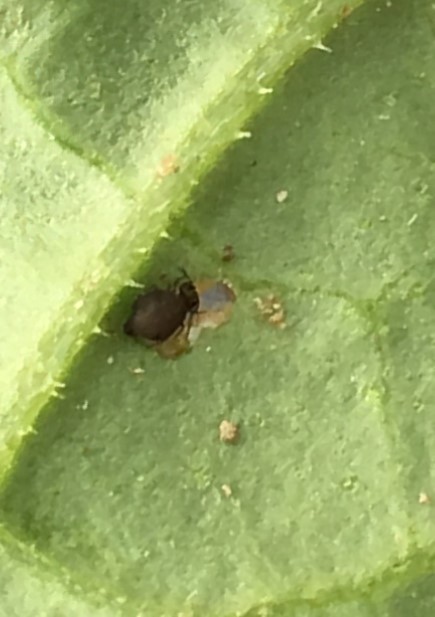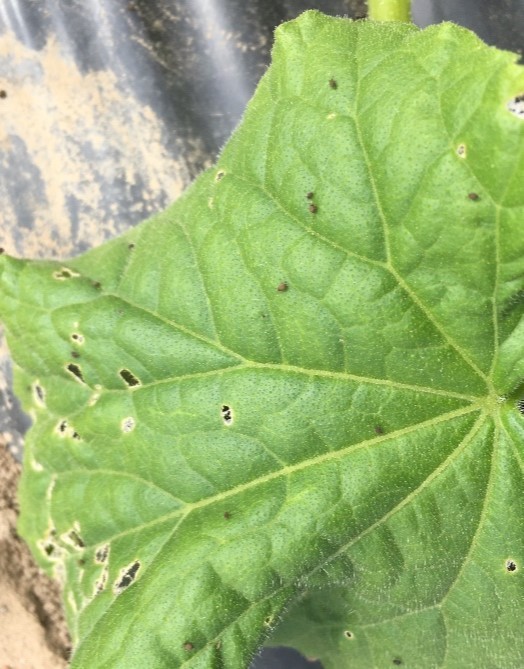A Spring Tale of Springtails
Teresa Rusinek, Vegetable Specialist
Eastern New York Commercial Horticulture
Last week, I went to check on a problem a grower was having in his high tunnel cucumber crop. Carefully inspecting the leaves, I found many tiny, 1/16th of inch-long insects all over the cucumber plants. They jumped about from one cucumber plant to the next, munching away at tender foliage that was beginning to look like Swiss cheese!
The minuscule insects turned out to be springtails. In my 20+ years diagnosing vegetable pest problems, I've never come across these as a crop pest. For the most part springtails, also known as Collembola, feed on decaying plant material and are considered beneficial. But, under dry soil conditions, springtails seeking moisture may feed on and cause significant injury to young plants. The damage and appearance of springtails can look very much like flea beetles, but we don't typically see flea beetles attacking cucumber and the springtails are about half the size of a flea beetle. Similar to a flea beetle, they will spring away when disturbed using a structure under their abdomen called a furcular.
Springtails have been reported feeding on many veg crops including beans, beets broccoli potato radish, and even garlic. According to Cornell pest management guidelines, "These insects are generally susceptible to insecticides and are likely to be controlled when an application is made to control another seedling pest."
Springtails lay eggs in moist soil with high organic matter. The eggs hatch out into juveniles in about 10 days and then molt multiple times throughout the season. Adults may live through the year but only seem to be a problem to crops in May or June when plants are small and tender.
This article is from the May 17 2018 edition of the ENYCHP Vegetable News. Click Here to view the full newsletter.



Upcoming Events
2026 Northeast Extension Fruit Consortium Winter Webinar Series
February 4, 2026 : Management of Up and Coming Strawberry Diseases in the Northeastern United States
Session 1: Management of Up and Coming Strawberry Diseases in the Northeastern United States
February 11, 2026 : Kiwiberry Production in the Northeast
Session 2: Kiwiberry Production in the Northeast
February 18, 2026 : Heat Mitigation- Sunburn and Fruit Coloring
Session 3: Heat Mitigation- Sunburn and Fruit Coloring
February 25, 2026 : The Dating Game- Updates in Lepidopteran Mating Disruption
Session 4: The Dating Game- Updates in Lepidopteran Mating Disruption
March 4, 2026 : USEPA Endangered Species Act Strategies and Pesticide Use
Session 5: USEPA Endangered Species Act Strategies and Pesticide Use
March 11, 2026 : Practical Drought Management for Fruit Growers
Session 6: Practical Drought Management for Fruit Growers
Managing the Invasive Swede Midge Webinar
March 6, 2026 : Managing the Invasive Swede Midge Webinar
Swede midge is an invasive fly that causes serious economic losses to brassica crops. Due to its small size and hidden feeding habits, swede midge is often called an "invisible pest" and damage may be misdiagnosed. In this webinar, we will review the swede midge life cycle and crop damage symptoms, current management recommendations, new research findings, and highlights from on-farm case studies with a focus on organic management.
New Farm Manager Skills Day - Get the Tools You Need to Grow Your People (Hudson Valley)
March 10, 2026 : New Farm Manager Skills Day - Get the Tools You Need to Grow Your People
Millbrook, NY
Are you moving into a supervisory farm management role this season and want to get off to a good start? Are you an experienced manager who wants to connect with other "people" managers and work on your skills? This one-day workshop is for you!












































